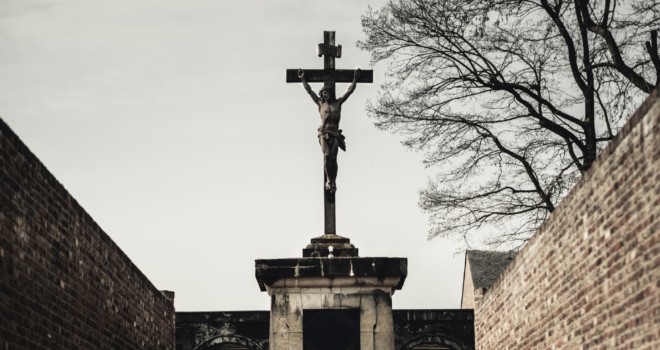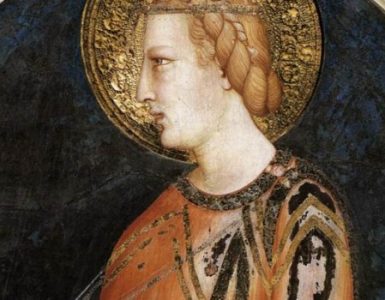The changing of the seasons affords us an opportunity to reflect on the seasons of life and the seasons of the Church. As we enter Spring, the cold and frost have given way to heavy rain showers and colorful buds bursting on trees. The darkness has given way to light. The new is shuffling out the old.
What is it that fuels nature’s constancy in its seasons? What propels it forward through the harshness of winter? What propels us forward through the harshness of life?
There is a lot of darkness, gunk, and discomfort around us. It’s an election year (need I say more?). It’s almost the end of Lent and maybe we’ve completely “failed” at it. People we love are struggling. We are struggling. And while there is always suffering in the world, the sword seems to pierce our hearts a little deeper during Holy Week, as we enter more intensely into the depth and width of Our Lord’s suffering. The pain can be so acute during this time as the ugliness of our sins are illustrated so clearly before us.
And when we’re in the thick of the really hard stuff, it’s easy to loosen our grip on the virtue of Hope. We tend to slip into the fog of doubt, into the forgetfulness that this is our Father’s world.
Sometimes Hope gets glanced over in the trio of the Theological Virtues. We battle cry for Faith and Love, but perhaps perceive Hope to be a sissy virtue. “Hope” is a word we often throw around in reference to situations that are dismal. “I hope so”, is often uttered from our lips with a sigh and eye roll in reference to situations or people that we have already deemed hopeless.
But flip through virtually any book in the Bible, and Hope dances across the pages; not only in nominal reference but in the stories of the passionate men and women of God who have trod the path before us. Hope is the song of Scripture, the anthem of the people of God.
“Hope is the theological virtue by which we desire the kingdom of heaven and eternal life as our happiness, placing our trust in Christ’s promises and relying not on our own strength, but on the help of the grace of the Holy Spirit.” (CCC 1817)
Hope isn’t a nice sentiment, it’s what has fueled believers through the really hard stuff, the darkness, the frost of life, the loss of Christ on Good Friday, and the election years. It’s the quiet but mighty grace of the Holy Spirit that strengthens us to return to the Lord, to trust in Him, and to desire to be with Him.
During Holy Week, as we excavate for evidence of Hope throughout the Passion narrative, it’s difficult not to think of the two Apostles who perhaps betrayed Jesus the most: Judas and Peter.
We know the stories well: Judas sells Jesus for silver, and Peter fulfills Christ’s prophecy by denying the Lord three different times after His arrest.
Both men had been with Jesus since the beginning of His public ministry. Both had witnessed the miracles, heard the teachings, dined with Him, listened to Him, gave up everything for Him. Both men had their feet washed by Jesus, had been commissioned to “do this in memory of Me”.
And when the going got tough, they both bailed.
Today then, why do we pray for Judas but ask Peter to pray for us? After their saddening betrayal, what made the difference?
Where Judas despaired, Peter hoped. When convicted of their sin, Judas thought himself too far from God’s mercy, while Peter knew his only home and his only happiness was in the Heart of Christ.
And because of Peter’s hope for eternal life, and his trust in what the Lord had promised, he returned to Jesus with a humble and contrite heart, professing his overwhelming love for the Lord, and finally being entrusted with Jesus’ Bride, the Church (see John 21:15-17)
What does this mean for us now, during this Holy Week? Well, it means that while we sift through the fog and sit in the thick of it, we have two choices: despair or hope. We either flee from the God who loves us or return to Him with a heart that’s broken and pitiful but that’s also willing to love and serve Him. We either trudge through the mundane tasks of our day or trust that the Lord is doing something profound and good in the midst of the seemingly small. We either throw our hands in the air, claiming that our situation is hopeless, or we can cling to that brave virtue and let our hearts be glad.
“The virtue of hope responds to the aspiration to happiness which God has placed in the heart of every man; it takes up the hopes that inspire men’s activities and purifies them so as to order them to the Kingdom of heaven; it keeps man from discouragement; it sustains him during times of abandonment; it opens up his heart in expectation of eternal beatitude. Buoyed up by hope, he is preserved from selfishness and led to the happiness that flows from charity.” (CCC 1818)
Hope is what fuels us through the cold and dry seasons. Hope is what propels us from Good Friday to Easter Sunday. Hope is what sustains us during the diligent work of becoming saints. Hope is what makes the difference.
✠
Photo by milan degraeve on Unsplash












